Podcast: Play in new window | Download (Duration: 12:24 — 17.0MB) | Embed
Subscribe: Apple Podcasts | Spotify | Amazon Music | Android | Pandora | iHeartRadio | JioSaavn | Podchaser | Gaana | Podcast Index | Email | TuneIn | Deezer | Anghami | RSS | More

Introduction to the Devotion
The Seven Graces of the Devotion
Benefits of the Devotion to the Mother of Sorrows
Sorrow 1
The Presentation in the Temple
Sorrow as sharp as a sword shall pierce Mary’s heart because of her Child. Mary is in the Temple, having come with Joseph to present the Child to God. They meet Simeon, the holy man, and Anna, the prophetess. Simeon takes the Baby in his arms, saying he will now die in peace because he has seen Christ, then he foretells the sorrow to come.
FIRST PRAYER OF THE CHAPLET:
The Seven Dolores of The Blessed Virgin Mary
V: O God, come to my assistance;
R: O Lord, make haste to help me
V: Glory be to the Father, and to the Son, and to the Holy Spirit.
R: As it was in the beginning, is now, and ever shall be, world without end. Amen.
1. I grieve for you, O Mary, most sorrowful, in the affliction of your tender heart at the prophecy of the holy and aged Simeon. Dear Mother, by your heart so afflicted, obtain for me the virtue of humility and the gift of the holy fear of God.
Hail Mary, full of grace, the Lord is with thee. Blessed art thou among women and blessed is the fruit of of thy womb, Jesus. Holy Mary, Mother of God, pray for us sinners, now, and at the hour of our death. Amen.
Sorrow 2
The Flight into Egypt
Soon the sword of sorrow strikes. Herod the King seeks to kill the Child. Warned in sleep by an angel, Joseph takes Jesus and His Mother Mary, setting out for Egypt, where they lived in obscurity and poverty until it was safe to return to Nazareth.
THE SECOND PRAYER OF THE CHAPLET:
The Seven Dolores of The Blessed Virgin Mary
V: O God, come to my assistance;
R: O Lord, make haste to help me
V: Glory be to the Father, and to the Son, and to the Holy Spirit.
R: As it was in the beginning, is now, and ever shall be, world without end. Amen.
2. I grieve for you, O Mary most sorrowful, in the anguish of your most affectionate heart during the flight into Egypt and your sojourn there.
Dear Mother, by your heart so troubled, obtain for me the virtue of generosity, especially toward the poor, and the gift of piety.
Hail Mary, full of grace, the Lord is with thee. Blessed art thou among women and blessed is the fruit of of thy womb, Jesus. Holy Mary, Mother of God, pray for us sinners, now, and at the hour of our death. Amen.
Sorrow 3
Loss of Jesus For Three Days
When Jesus is twelve, He is taken to Jerusalem for the Feast of Passover. On the return journey Joseph and Mary find at the end of the first day that Jesus is not with them. Racked with anxiety, they search for Him. Nobody in the streets, not even the beggars, can tell them where He is. Not till the third day do they find Him, in the Temple.
THE THIRD PRAYER OF THE CHAPLET:
The Seven Dolores of The Blessed Virgin Mary
V: O God, come to my assistance;
R: O Lord, make haste to help me
V: Glory be to the Father, and to the Son, and to the Holy Spirit.
R: As it was in the beginning, is now, and ever shall be, world without end. Amen.
3. I grieve for you, O Mary most sorrowful, in those anxieties which tried your troubled heart at the lost of your dear Jesus. Dear Mother, by your heart so full of anguish, obtain for me the virtue of chastity and the gift of knowledge.
Hail Mary, full of grace, the Lord is with thee. Blessed art thou among women and blessed is the fruit of of thy womb, Jesus. Holy Mary, Mother of God, pray for us sinners, now, and at the hour of our death. Amen.
Sorrow 4
The Way to Calvary
Mary has known fear and sorrow, but none so great as seeing her beloved Son stumbling under the weight of the Cross. She hears the jeering shouts from the crowd and has no power to help Him. Pity and love are in her eyes as she gazes at His blood-stained face. To many around her He is no better than a criminal, and her heart is breaking as she follows Him to Calvary or Golgotha.
THE FOURTH PRAYER OF THE CHAPLET:
The Seven Dolores of The Blessed Virgin Mary
V: O God, come to my assistance;
R: O Lord, make haste to help me
V: Glory be to the Father, and to the Son, and to the Holy Spirit.
R: As it was in the beginning, is now, and ever shall be, world without end. Amen.
4. I grieve for you, O Mary most sorrowful, in the consternation of your heart at meeting Jesus as He carried His cross. Dear Mother, by your heart so troubled, obtain for me the virtue of patience and the gift of fortitude.
Hail Mary, full of grace, the Lord is with thee. Blessed art thou among women and blessed is the fruit of of thy womb, Jesus. Holy Mary, Mother of God, pray for us sinners, now, and at the hour of our death. Amen.
Sorrow 5
The Crucifixion
With John, Mary stands at the foot of the Cross. “A sword shall pierce thy soul,” Simeon told her. Truly her heart is pierced with sorrow. Her beloved Son is dying and she shares in His suffering. She does not ask God to take away this agony. She is His Mother, so close to Him that His pain is hers, too. And now He speaks from the Cross: “Woman, behold thy son.” Jesus give His Mother to John, and to us. For all eternity she is our Mother.
THE FIFTH PRAYER OF THE CHAPLET:
The Seven Dolors of The Blessed Virgin Mary
V: O God, come to my assistance;
R: O Lord, make haste to help me
V: Glory be to the Father, and to the Son, and to the Holy Spirit.
R: As it was in the beginning, is now, and ever shall be, world without end. Amen.
5. I grieve for you, O Mary most sorrowful, in the martyrdom which your generous heart endured in standing near Jesus in His agony. Dear Mother, by your afflicted heart, obtain for me the virtue of temperance and the gift of counsel.
Hail Mary, full of grace, the Lord is with thee. Blessed art thou among women and blessed is the fruit of of thy womb, Jesus. Holy Mary, Mother of God, pray for us sinners, now, and at the hour of our death. Amen.
Sorrow 6
The Descent from the Cross
It is over. Dark clouds have appeared in the sky and upon the world. Jesus is dead. Joseph of Arimathea and Nicodemus take down the Body from the Cross. and Mary receives It in her arms. She is filled with a sadness that no human heart has known. This is her Son. Once she had cradled Him in her arms. listened to His voice, watched Him working at the carpenter’s bench. Now He is dead. She does not weep, her grief is too great for tears.
THE SIXTH PRAYER OF THE CHAPLET:
The Seven Dolores of The Blessed Virgin Mary
V: O God, come to my assistance;
R: O Lord, make haste to help me
V: Glory be to the Father, and to the Son, and to the Holy Spirit.
R: As it was in the beginning, is now, and ever shall be, world without end. Amen.
6. I grieve for you, O Mary most sorrowful, in the wounding of your compassionate heart, when the side of Jesus was struck by the lance before His Body was removed from the cross. Dear Mother, by your heart thus transfixed, obtain for me the virtue of fraternal charity and the gift of
understanding.
Hail Mary, full of grace, the Lord is with thee. Blessed art thou among women and blessed is the fruit of of thy womb, Jesus. Holy Mary, Mother of God, pray for us sinners, now, and at the hour of our death. Amen.
Sorrow 7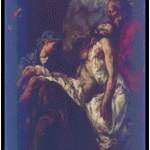
The Burial of Jesus
Hastily the Body is wrapped in a clean linen cloth. Nicodemus has brought myrrh and aloes, and the Body is bound in the Shroud with them. nearby is a new tomb, belonging to Joseph of Arimathea, and there they lay Jesus. Mary and John and the holy women follow them and watch as the great stone to the sepulchre is rolled. it is the end.
THE SEVENTH PRAYER OF THE CHAPLET:
The Seven Dolores of The Blessed Virgin Mary
V: O God, come to my assistance;
R: O Lord, make haste to help me
V: Glory be to the Father, and to the Son, and to the Holy Spirit.
R: As it was in the beginning, is now, and ever shall be, world without end. Amen.
7. I grieve for you, O Mary most sorrowful, for the pangs that wrenched your most loving heart at the burial of Jesus. Dear Mother, by your heart sunk in the bitterness of desolation, obtain for me the virtue of diligence and the gift of wisdom.
Hail Mary, full of grace, the Lord is with thee. Blessed art thou among women and blessed is the fruit of of thy womb, Jesus. Holy Mary, Mother of God, pray for us sinners, now, and at the hour of our death. Amen.
PRAYER OF ST. ALPHONSUS DE LIGUORI
O afflicted Virgin, O soul great in virtues, as in sorrows, both the one and the other spring from that great fire burning in thyr heart for God, the only love of thy heart!
Mother, have pity on me, who has not loved God, and who has so greatly offended Him. Thy sorrows, it is true, assure me of pardon, but that is not sufficient. I wish to love God. Who could obtain for me that grace if not thee, who are the Mother of holy love! O Mary, Thou consolest everyone; favor me also, with thy consolations. Amen.
top
_______________________________________________________
The purpose of the Devotion of the Seven Sorrows is to promote union with the sufferings of Christ through union with the special suffering that Our Lady endured because she was the Mother of God. By uniting ourselves with both the Passion of Christ and His holy Mother, we enter into Jesus’ Heart and honor Him greatly; He is more honored because we have so honored His Mother.
The Seven Dolors are taken from Scripture events and the devotion has a long history, although it was not officially promulgated by the Church until the early nineteenth century. Before Pope Pius VII’s formal approval, the Servite Order had permission in 1668 to celebrate the Feast of the Seven Dolors because the Order was instrumental in popularizing the Seven Sorrows Devotion.
In the Middle Ages, Catholic theology concentrated mostly on Christ’s Passion; at the side of the Man of Sorrows, however, the faithful always contemplated the Queen of Martyrs. Devotion to the Crucified Christ and to Our Lady of sorrows grew side by side. On Calvary there were in a sense two altars, one in the Body of Jesus, and the other in the Immaculate Heart. Christ immolated His flesh, Mary, her heart, her own soul. On September 15, the day following the ancient feast of the Holy Cross, the Church commemorates the compassion of Mary; but it is fitting during the year, especially during Lent, to honor the Sorrows of Mary.
Mary is not mentioned in the Gospel accounts of Christ’s Transfiguration, His entry into Jerusalem, but she is recorded as being present at Calvary. She understood what the Will of God was and was faithful, co-operating with her Son as Co-redemptrix. She had prepared the victim for sacrifice and now she offered Him on the altar of Calvary.
The Gospel, John 19:25, says: “Near the Cross of Jesus stood His mother, his mother’s sister, Mary, the wife of Cleopas, and Mary Magdalene.” At Christ’s bequest, Mary was proclaimed the universal Mother of mankind from the Cross.
Mary had three loves in her Immaculate Heart: God, her Son, and souls. She so loved the world that she gave her only Son. As St. Bernard said, “The sword would not have reached Jesus if it had not pierced Mary’s heart.” Mary loved souls and on Calvary, after suffering such cruel torments she merited being the mother of all mankind.
Mary is the Apostle because she is Co-redemptrix: Behold Mary on Calvary, she suffers and prays; she stands, as one offering sacrifice.
St. Ambrose said, “I read that she stood, but I do not read that she wept.” When Mary gave us her Son, she gave us everything. Therefore it can very well be said: “Behold this heart which has so greatly loved all people that it has spared nothing for them.”
top
The Seven Graces of this Devotion
1. I will grant peace to their families.
2.They will be enlightened about the Divine mysteries.
3. I will console them in their pains and I will accompany them in their work.
4. I will give them as much as they ask for as long as it does not oppose the adorable will of my Divine Son or the sanctification of their souls.
5. I will defend them in their spiritual battles with the infernal enemy and I will protect them at every instant of their lives.
6. I will visibly help them at the moment of their death, they will see the face of their Mother.
7. I have obtained this Grace from my Divine Son, that those who propagate this devotion to my tears and dolors, will be taken directly from this earthly life to eternal happiness since all their sins will be forgiven and my Son and I will be their eternal consolation and joy.
top
1. To realize the value of a soul, worth the supreme Sacrifice on Calvary.
2. To work for souls, by evangelization, duty to life’s duties, and
prayer for sinners.
3. To pray always, in a life of union with God; whoever has a heart similar to Jesus’ and Mary’s hearts, will work for the salvation of souls.
When we commit sin we bring sorrow to Our Lady, for she is, indeed
our very Mother, our spiritual Mother, and she watches over
us as she watched over her Baby, nearly two thousand years ago.
It is the desire of Jesus that we should think of His Passion, to offer Him
our devotion and to renew our sorrow for sin. It is also His desire,
as the Church makes clear to us, that we should think of the
compassion of Mary in His Passion.
top

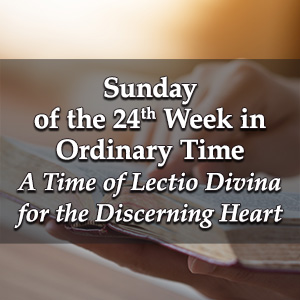 Sunday of the Twenty-Fourth Week in Ordinary Time – A Time of Lectio Divina for the Discerning Heart Podcast
Sunday of the Twenty-Fourth Week in Ordinary Time – A Time of Lectio Divina for the Discerning Heart Podcast
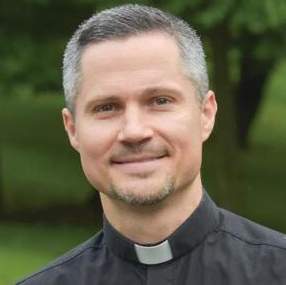
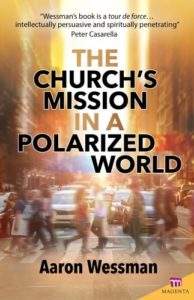
 Friday of the Twenty-Third Week in Ordinary Time- A Time of Lectio Divina for the Discerning Heart Podcast
Friday of the Twenty-Third Week in Ordinary Time- A Time of Lectio Divina for the Discerning Heart Podcast





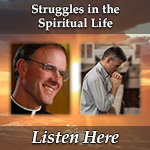

 Monday of the Twenty-Third Week in Ordinary Time – A Time of Lectio Divina for the Discerning Heart Podcast
Monday of the Twenty-Third Week in Ordinary Time – A Time of Lectio Divina for the Discerning Heart Podcast